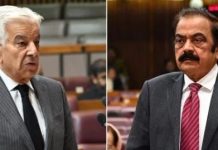Air Commodore Khalid Iqbal (Retd)
In India, the ascendancy to political power requires attracting the Hindu votes. This reality is well known to Prime Minister Narendra Modi. Therefore, historically, some of Rashtriya Swayamsevak Sangh and Bharatiya Janata Party’s (RSS-BJP) discriminatory moves against religious minorities come either on the heels of a major election victory or in the run-up to elections. For India’s upcoming general elections, the vote is blatantly being sought on anti-minority sentiment. A group of United Nations Special Rapporteurs has urged “corrective actions to protect human rights and attacks against minorities in the run-up to India’s national elections”.
To perpetuate the RSS-BJP rule, the Modi government has incrementally mixed religion with politics in an intoxicating combination that fascinates India’s Hindu majority population, especially the extremist factions. Traditionally, airing a strong anti-minority sentiment in general, and radiating hatred towards Muslims, in particular, have been the hallmark of the RSS-BJP electoral campaigns. And, with regard to India’s foreign policy, anti-Pakistan and anti-China rhetoric is added to election sloganeering to magnify the jingoistic impersonation of the BJP leadership.
The RSS-BJP duo reinforced work on this strategy soon after winning the second term by the incumbent government in 2019. Since then, massive legislation has taken place to ensure legal cover for accruing undue electoral advantage to the BJP by mobilising the Hindu vote through promotion of hate against minorities. Some of these laws remained dormant for over four years until they were given an operative push as the 2024 elections approached. The broader objective of unleashing a whole range of anti-minority laws is to speedily institutionalise the conversion of a secular India into a Hindu state. The mushrooming tide of Hindutva is causing speedy economic, social, and political marginalisation of minority communities.
The autonomous status of Jammu and Kashmir was illegally repealed by the Indian government on 05 August 2019. Likewise, the Citizenship Amendment Act (CAA) was passed in December 2019. Some of the recent moves focused on revitalising these laws for enhancing the dividends of upcoming elections are: on 10 December 2023, the BJP government was able to get a verdict from the Indian Supreme Court (ISC) in favour of the revocation of Articles 370 and 35A of the Indian constitution, hence giving legal cover to the annexation of IIOJK; on 11 March the “Citizenship (Amendment) Rules 2024” were issued to enforce the CAA 2019; On 16 January, a newly built temple in Ajodhya was dedicated to the Hindu deity Ram. This temple was constructed on the site of the historic Babri Mosque that was demolished by Hindu fanatics in 1992, under the protection of the BJP’s provincial government; and, on 19 March, fourteen political parties of IIOJK were disbanded, to ensure a BJP walkover in the upcoming state elections.
The ISC agreed on 19 March to consider a plea to stay the operation of the CAA Rules on 9 April, just ten days before the first phase of the Lok Sabha elections would begin. The Indian government has refused to make a statement that it would not grant hasty nationality to non-Muslim immigrants while the case trial proceeds at the ISC. By the time the verdict is pronounced, the major damage would have occurred. The SCI appears hand in glove with the RSS-BJP government to disenfranchise a major chunk of Indian minorities before the upcoming election. In the Indian state of Assam, CAA has triggered anxieties that the law, combined with the “National Register of Citizens”, may be invoked to pronounce the decades-old residents as illegal immigrants from Bangladesh, hence leading to taking away their citizenship.
Indian opposition parties’ leadership has labelled the CAA rules “communal and divisive”. Congress has stated that “the timing right before the elections is evidently designed to polarise the elections.” Some chief ministers of Indian states have even refused to implement the law in their respective states.
There has been a continuous downpour of international condemnation of these discriminatory anti-minority laws. Soon after the promulgation of the CAA Act 2019, the “US Commission on International Religious Freedom” (USCIRF) called it “a dangerous turn in the wrong direction”. The US government and the United Nations have expressed concerns, calling CAA “fundamentally discriminatory in nature”. Pakistan has also expressed concerns over the Indian government’s recent move to implement the controversial law. The UN High Commissioner for Human Rights (UNHCR) has termed the notification of CAA-related rules 2024 “fundamentally discriminatory” and “in breach of international obligations of India.” Amnesty International said “it discriminates against Muslims”. Amnesty India stated that the law “goes against the constitutional values of equality and international human rights law.”
Pre-election polls indicate that the BJP and its allies are likely to win more than 400 seats, which is well above the two-thirds majority. Yet the RSS-BJP’s appetite for grabbing absolute power is propelling it to stampede the minorities’ political rights. The international community, in general, and the UNHCR, in particular, need to persuade India for an immediate course correction.
Air Commodore Khalid Iqbal (Retd) is Director National Security at Centre for Aerospace and Security Studies (CASS), Lahore Pakistan. He may be reached at [email protected]

















